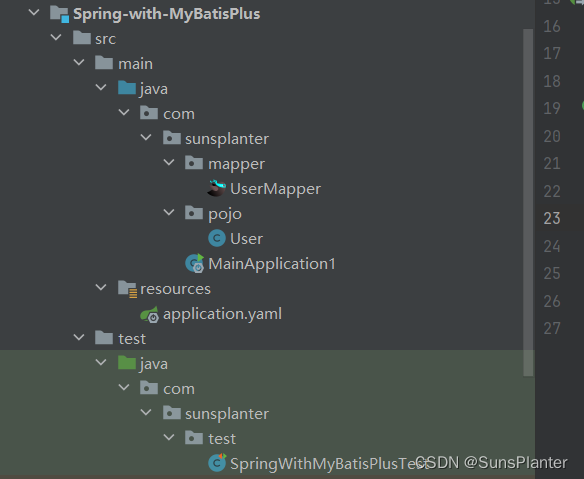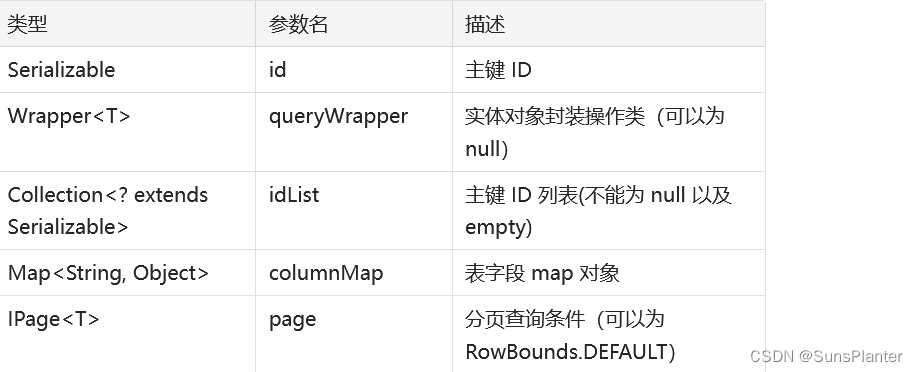02 MyBatisPlus核心功能之基于Mapper接口CRUD+基于Service接口实现CRUD
发布时间:2024年01月19日
项目结构:

1.1 Insert方法
// 插入一条记录
// T 就是要插入的实体对象
// 默认主键生成策略为雪花算法(后面讲解)
//返回值是影响条数
int insert(T entity);
1.2 Delete方法
// 根据 entity 条件,删除记录
int delete(@Param(Constants.WRAPPER) Wrapper<T> wrapper);
// 删除(根据ID 批量删除)
int deleteBatchIds(@Param(Constants.COLLECTION) Collection<? extends Serializable> idList);
// 根据 ID 删除
int deleteById(Serializable id);
// 根据 columnMap 条件,删除记录
int deleteByMap(@Param(Constants.COLUMN_MAP) Map<String, Object> columnMap);

何为Wrapper wrapper ?
执行语句时我们可能存在多个条件,例如同时要求年龄大于18,且为女生,此时把多个条件封装进其中,本质就是一个条件封装对象
何为Map<String,Object> ?
与Wrapper很相似 , 可以将 age =18 , sex = 1装入Map中 , 即封装多个键值对
Map map = new HashMap();
map.put("age",20);
int rows = userMapper.deleteByMap(map);
1.3 Update方法
// 第一个参数是要改的实体 , 第二个条件是判断的参数 ,根据 whereWrapper 条件,更新记录
int update(@Param(Constants.ENTITY) T updateEntity,
@Param(Constants.WRAPPER) Wrapper<T> whereWrapper);
// 根据 ID 修改 主键属性必须存在
int updateById(@Param(Constants.ENTITY) T entity);

//updateById,根据传入对象的主键值去更新剩余值
User user = new User();
user.setId(1L);
user.setAge(19);
//等价于 update user set age = 30 where id = 1
int rows = userMapper.updateById(user);
//update
User user = new User();
user.setAge(22);
//等价于 update user set age = 22 ,省略了判断条件,更新所有行的age为22
int rows = userMapper.update(user,null);
1.4 Select方法
// 根据 ID 查询
T selectById(Serializable id);
// 根据 entity 条件,查询一条记录
T selectOne(@Param(Constants.WRAPPER) Wrapper<T> queryWrapper);
// 查询(根据ID 批量查询)
List<T> selectBatchIds(@Param(Constants.COLLECTION) Collection<? extends Serializable> idList);
// 根据 entity 条件,查询全部记录
List<T> selectList(@Param(Constants.WRAPPER) Wrapper<T> queryWrapper);
// 查询(根据 columnMap 条件)
List<T> selectByMap(@Param(Constants.COLUMN_MAP) Map<String, Object> columnMap);
// 根据 Wrapper 条件,查询全部记录
List<Map<String, Object>> selectMaps(@Param(Constants.WRAPPER) Wrapper<T> queryWrapper);
// 根据 Wrapper 条件,查询全部记录。注意: 只返回第一个字段的值
List<Object> selectObjs(@Param(Constants.WRAPPER) Wrapper<T> queryWrapper);
// 根据 entity 条件,查询全部记录(并翻页)
IPage<T> selectPage(IPage<T> page, @Param(Constants.WRAPPER) Wrapper<T> queryWrapper);
// 根据 Wrapper 条件,查询全部记录(并翻页)
IPage<Map<String, Object>> selectMapsPage(IPage<T> page, @Param(Constants.WRAPPER) Wrapper<T> queryWrapper);
// 根据 Wrapper 条件,查询总记录数
Integer selectCount(@Param(Constants.WRAPPER) Wrapper<T> queryWrapper);

1.5 自定义查询方法
如上所述,MP只为我们定义了单表的很多查询方法,如果是单表的一些特殊查询,亦或是多表查询,就需要自己编写语句了,方法如下:
在application.yaml中声明MP的默认mapperxml位置
mybatis-plus: # mybatis-plus的配置
# 默认位置 private String[] mapperLocations = new String[]{"classpath*:/mapper/**/*.xml"};
mapper-locations: classpath:/mapper/*.xml
自定义mapper方法:
package com.sunsplanter.mapper
public interface UserMapper extends BaseMapper<User> {
//正常自定义方法!
//可以使用注解@Select或者mapper.xml实现
List<User> queryAll();
}
基于mapper.xml实现:
<?xml version="1.0" encoding="UTF-8" ?>
<!DOCTYPE mapper
PUBLIC "-//mybatis.org//DTD Mapper 3.0//EN"
"https://mybatis.org/dtd/mybatis-3-mapper.dtd">
<!-- namespace = 接口的全限定符 -->
<mapper namespace="com.sunsplanter.mapper.UserMapper">
<select id="queryAll" resultType="user" >
select * from user
</select>
</mapper>
2 基于Service接口实现CRUD
通用 Service CRUD 封装[IService 接口,进一步封装 CRUD。采用 get 查询单行 remove 删除 list 查询集合 page 分页 前缀命名方式区分 Mapper 层避免混淆,
2.1 对比Mapper接口CRUD区别:
- service添加了批量方法
- service层的方法自动添加事务
2.1 使用Iservice接口方式
接口继承IService接口
public interface UserService extends IService<User> {
}
类继承ServiceImpl实现类
@Service
public class UserServiceImpl extends ServiceImpl<UserMapper,User> implements UserService{
}
CRUD方法介绍
保存:
// 插入一条记录(选择字段,策略插入)
boolean save(T entity);
// 插入(批量)
boolean saveBatch(Collection<T> entityList);
// 插入(批量)
boolean saveBatch(Collection<T> entityList, int batchSize);
修改或者保存:
// TableId 注解存在更新记录,否插入一条记录
boolean saveOrUpdate(T entity);
// 根据updateWrapper尝试更新,否继续执行saveOrUpdate(T)方法
boolean saveOrUpdate(T entity, Wrapper<T> updateWrapper);
// 批量修改插入
boolean saveOrUpdateBatch(Collection<T> entityList);
// 批量修改插入
boolean saveOrUpdateBatch(Collection<T> entityList, int batchSize);
移除:
// 根据 queryWrapper 设置的条件,删除记录
boolean remove(Wrapper<T> queryWrapper);
// 根据 ID 删除
boolean removeById(Serializable id);
// 根据 columnMap 条件,删除记录
boolean removeByMap(Map<String, Object> columnMap);
// 删除(根据ID 批量删除)
boolean removeByIds(Collection<? extends Serializable> idList);
更新:
// 根据 UpdateWrapper 条件,更新记录 需要设置sqlset
boolean update(Wrapper<T> updateWrapper);
// 根据 whereWrapper 条件,更新记录
boolean update(T updateEntity, Wrapper<T> whereWrapper);
// 根据 ID 选择修改
boolean updateById(T entity);
// 根据ID 批量更新
boolean updateBatchById(Collection<T> entityList);
// 根据ID 批量更新
boolean updateBatchById(Collection<T> entityList, int batchSize);
数量:
// 查询总记录数
int count();
// 根据 Wrapper 条件,查询总记录数
int count(Wrapper<T> queryWrapper);
查询:
// 根据 ID 查询
T getById(Serializable id);
// 根据 Wrapper,查询一条记录。结果集,如果是多个会抛出异常,随机取一条加上限制条件 wrapper.last("LIMIT 1")
T getOne(Wrapper<T> queryWrapper);
// 根据 Wrapper,查询一条记录
T getOne(Wrapper<T> queryWrapper, boolean throwEx);
// 根据 Wrapper,查询一条记录
Map<String, Object> getMap(Wrapper<T> queryWrapper);
// 根据 Wrapper,查询一条记录
<V> V getObj(Wrapper<T> queryWrapper, Function<? super Object, V> mapper);
集合:
// 查询所有
List<T> list();
// 查询列表
List<T> list(Wrapper<T> queryWrapper);
// 查询(根据ID 批量查询)
Collection<T> listByIds(Collection<? extends Serializable> idList);
// 查询(根据 columnMap 条件)
Collection<T> listByMap(Map<String, Object> columnMap);
// 查询所有列表
List<Map<String, Object>> listMaps();
// 查询列表
List<Map<String, Object>> listMaps(Wrapper<T> queryWrapper);
// 查询全部记录
List<Object> listObjs();
// 查询全部记录
<V> List<V> listObjs(Function<? super Object, V> mapper);
// 根据 Wrapper 条件,查询全部记录
List<Object> listObjs(Wrapper<T> queryWrapper);
// 根据 Wrapper 条件,查询全部记录
<V> List<V> listObjs(Wrapper<T> queryWrapper, Function<? super Object, V> mapper);
文章来源:https://blog.csdn.net/m0_46671240/article/details/135687034
本文来自互联网用户投稿,该文观点仅代表作者本人,不代表本站立场。本站仅提供信息存储空间服务,不拥有所有权,不承担相关法律责任。 如若内容造成侵权/违法违规/事实不符,请联系我的编程经验分享网邮箱:chenni525@qq.com进行投诉反馈,一经查实,立即删除!
本文来自互联网用户投稿,该文观点仅代表作者本人,不代表本站立场。本站仅提供信息存储空间服务,不拥有所有权,不承担相关法律责任。 如若内容造成侵权/违法违规/事实不符,请联系我的编程经验分享网邮箱:chenni525@qq.com进行投诉反馈,一经查实,立即删除!
最新文章
- Python教程
- 深入理解 MySQL 中的 HAVING 关键字和聚合函数
- Qt之QChar编码(1)
- MyBatis入门基础篇
- 用Python脚本实现FFmpeg批量转换
- 【LeetCode】242. 有效的字母异位词(简单)——代码随想录算法训练营Day06
- Unity中URP下抓屏的 开启 和 使用
- promise的async/await,让你的代码像同步一样执行
- 笔记2之软链接与硬链接
- 任务需求分析中的流程图、用例图、er图、类图、时序图线段、图形的作用意义
- 【考研复试上机】Ch2 排序与查找
- c++11 标准模板(STL)(std::pair)(五)创建一个 pair 对象,其类型根据各实参类型定义
- User-Agent(用户代理)是什么?
- 初识大数据,一文掌握大数据必备知识文集(12)
- Stable Diffusion(SD)核心基础知识——(文生图、图生图)